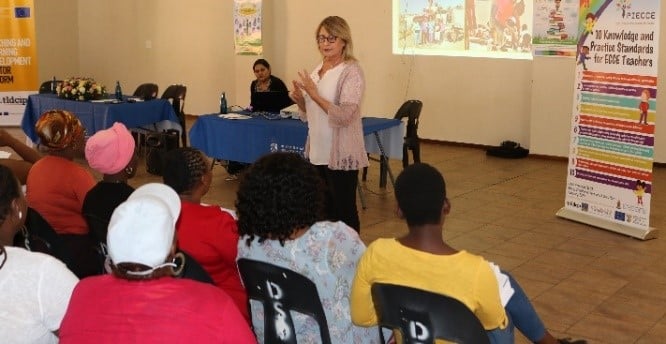The University of Pretoria (UP) wishes to acknowledge the European Union/Department of Higher Education and Training (EU/DHET) funding in the development of the Bachelor of Education in Early Childhood Care and Education (B Ed ECCE) programme. The programme has been developed as one of the sub-projects of the Teacher Education for Early Childhood Care and Education Project (TEECCEP), in line with the requirements of the Policy on Minimum Requirements for Programmes Leading to Qualifications in Higher Education for Early Childhood Development Educators (DHET, 2017).
This policy has for the first time in the history of South Africa provided an opportunity for ECD teachers to access higher education qualifications and craft a career in ECCE birth to four. Developing a cadre of professionally qualified ECCE teachers is in line with the vision of professionalisation, continuing professional development and creating career paths, as expressed in the National Integrated Early Childhood Development Policy (2015).
Given the acknowledged importance of the early years for development and growth, producing professionally qualified ECCE teachers is crucial to improving the quality of teaching and learning in ECCE in order to enable better outcomes for children. UP aims to contribute to fulfilling this need through offering the B Ed ECCE.
UP has also raised the visibility of ECCE by providing short seminars for practitioners on the delivery of quality ECCE programmes. On 15th March 2019, the Department of Early Childhood Education (ECE), with the assistance of an ECD forum in Mamelodi, Tshwane invited practitioners from Mamelodi and Eersterust to a seminar. The seminar was held in Mamelodi and the theme of the seminar was Professionalisation, Policy and Pedagogy in Playrooms. The keynote speaker, Professor Hasina Ebrahim, and postgraduate- and final year students delivered presentations on transforming ECCE teacher development to over 200 practitioners.
According to Prof Ebrahim, unlocking the potential of the youngest in our society is intricately interwoven with the quality of the practitioners we have in the birth to four workforce. At the start of her presentation she teased out the nuances of transformation as opposed to reformation in early years care and education. Contextual issues that warrant radical change in teacher development were also highlighted in her talk. One of the critical issues she emphasised relates to the need for a “new professional” who would be able to work with complexities and uncertainty as the new normal in early childhood care and education.
Prof Bipath and some final year students in the B Ed. Foundation Phase delivered poster presentations about the implementation of the Early Learning Development Areas from the National Curriculum Framework. PhD students from UP also presented on topics related to their research studies, covering the following areas of interest: teaching and learning in playrooms, quality resources in playgrounds and playrooms, and the transformation of the qualifications landscape for ECCE educators. The ECE Department hopes to hold bi-annual seminars in Mamelodi and other suburbs to introduce practitioners to more responsive early childhood practices for the development of our youngest citizens, the birth to four children.

One of the EU/DHET sponsored post-graduate studies in the ECCE field, carried out by Ms Pam Zulu, investigated how ECCE practitioners in rural and urban settings in KwaZulu-Natal perceive their education and training experiences. In her M Ed dissertation, Zulu (2020) concludes that an effective way to foster a positive professional identity and raise the profession’s esteem in communities is to ensure that practitioners attain professional qualifications in the field of ECCE. This research identified gaps and potential connections in the realm of practitioners’ education and training experiences in rural and urban settings in and near Durban, South Africa. The research further identified what types of support are needed from governmental and professional institutions to enhance teaching and learning in ECD centres. Zulu (2020) proposes an interesting model for mentoring and supporting practitioners’ education and training in rural areas and poor communities.
Zulu’s findings strongly substantiate the need for equity which drives the government’s policies in the sector and her study illustrates that significant differences exist between the respective education and training practices of ECCE practitioners in rural areas and those in urban areas. Inequalities exist in relation to resources, salaries, working conditions and opportunities for further studies and professional growth. If authorities are serious about breaking the poverty cycle in South Africa, then more support needs to be given to ECD centres in rural areas.
Other activities at UP that were made possible through the TEECEP included presenting papers and networking with global scholars about trends and issues in ECCE. Prof Keshni Bipath and Dr Judy van Heerden presented papers on ECCE at the 29th European Early Childhood Education Research Association (EECERA) conference held at Thessaloniki, Greece from 20 to 23 August 2019. At this conference thousands of delegates from across all continents reflected on the challenge for all nations of acknowledging the importance of the early years and of addressing the issue of measurement and accountability with regard to high quality ECCE. The conference placed attention on “What counts?” and “Who is making it count, and why?” Delegates encouraged ECD researchers to raise the profile and visibility of early childhood studies and to make it count in the corridors of power.
The ECE Department at the University of Pretoria is certainly ”making the early years count”, and is in the process of submitting the new B Ed ECCE programme to the Council on Higher Education (CHE) for accreditation. The Department hopes to implement the new qualification in 2023.
For further enquiries about the programme, please contact Prof Bipath at the University of Pretoria on
[email protected].
- Author Prof. Keshni Bipath


Get Social With Us
Download the UP Mobile App